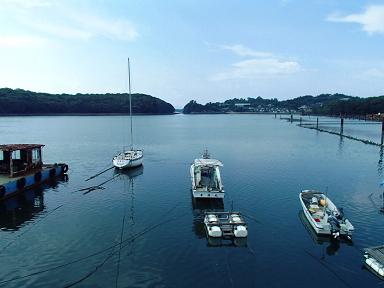News
3, 18, 24-26 July 2012: Fieldwork in Rural Communities - Minamata
The report in Japanese can be downloaded from here (6.22MB ![]() cover pages
cover pages ![]() report body pages.
report body pages.
=======================================================================================================
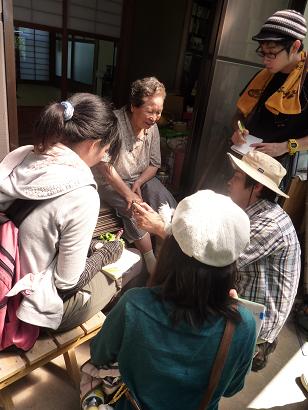 |
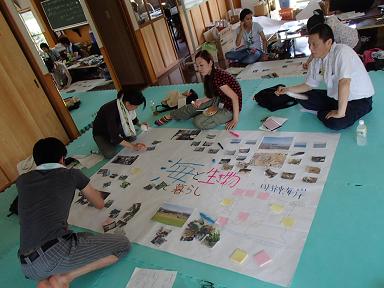 |
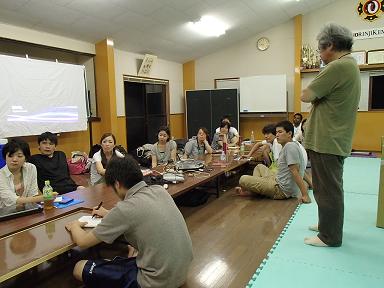 |
|
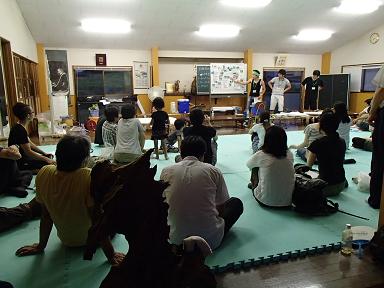 |
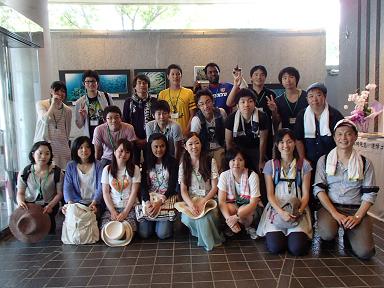 |
“Fieldwork in Rural Communities” has been launched as one of the FOLENS domestic training courses this year. Seventeen FOLENS students participated in the course coordinated by three faculty members (Sen. Assis. Prof. Masaaki Yamada and Assoc. Prof. Yosei Oikawa of Dept of International Environmental and Agricultural Science and Assis. Prof. Sachi Ninomiya-Lim of FOLENS).
While the other FOLENS domestic training courses have focused on environmental data acquisition/analysis and environmental engineering, this one put a focus on understanding of “society and people”, which forms a critical aspect of every environmental issues. However, as we recognized it is rather intrusive to try to understand a certain “society and people” within a few days long training, we rather set following aim: to help students recognize the importance and difficulty to understand society and people, and develop necessary attitudes and view points for it, through lectures and fieldwork in a Japanese rural community.
The course this year consisted of two in-class lecture/presentations and a three-day fieldwork in Minamata in Kumamoto Prefecture. Minamata is a place that has experienced one of the most serious health problems caused by industrial pollution in Japan since 1950’s – “Minamata Disease”. People in Minamata have suffered not only from the disease itself but also from environmental and economic loss, and serious conflicts and discriminations both within and outside local communities. One of the ways for them to overcome this hardship was to research their own communities by themselves to understand local characteristics, specialties, values and resources to rebuild their community relationships and identities through activities called “Jimotogaku” or participatory community study. Minamata is now known to be one of the most advanced environmental cities in Japan. The society and people in Minamata have so much to offer for the students who aim to become future environmental leaders in Asia and Africa to learn from.
Although three days were not long, we had a very intense and fruitful time, with a great support by people in Minamata. Particularly, Mr. Tetsuro Yoshimoto, a founder and a leader of Minamata Jimotogaku, guided us with his deep insights and rich experience, and Ms. Arisa Ori from Green Sports Minamata perfectly coordinated our visit with patient and generous support. A number of local people (listed in the schedule below) shared their precious stories based on their experience.
We are now preparing a detailed report book containing report by all the participated students and faculty members. It will be shared on this website as soon as finalized in November.(SN)
1) Introduction to Fieldwork in Minamata
Date: 3 July
Time: 16:30-18:00 (5th Period)
Place: Room 22-A, Main Building (Honkan 22-A), Fuchu Campus
Contents:
Lecture/video on background of Minamata Fieldwork
- Minamata Disease – History and background
- Minamata Jimotogaku or participatory community study - why and what?
Division of students into groups for presentation on 18 July
2) Students Presentation
Date: 18 July
Time: 13:00-14:30 (3rd Period)
Place: N103 (Multi-purpose Lecture Room), Building 2, Fuchu Campus
Contents:
Presentation by students
- Pollution and its impacts to people and society in Asia and Africa
Information on the Minamata field work
3) Fieldwork in Minamata
Date: 24-26 July (Detailed schedule will be notified in class)
Contents:
Day 1: Learning about Minamata Disease—visit to museums and local communities
Day 2: Training for participatory community study— “Jimoto-gaku” – by Mr. Tesuro Yshimoto
Day 3: Reflection on the participatory community study training/ Learning about present Minamata — Visit to Chisso/JNC
Tuesday 24 July
| Time | Activity | Lecturer |
| 10:00 | Arrive in Kumamoto Airport Move to Minamata by Bus Lecture on Participatory Community Study (Jimotogaku) by Mr. Yoshimoto | Mr. Tetsuro Yoshimoto |
| 11:30 | Arrive in Minamata/ Lunch | |
| 12:20 | Arrive in Shorinji Dojo (Fieldwork Base and Accommodation) | |
| 12:30 | Minamata Disease Municipal Museum | Ms. Arisa Ori |
| 13:30 | Minamata Bay Water Amenity Seawall | Ms. Arisa Ori |
| 14:00 | Depart Water Amenity Seawall | |
| 14:15 | Soshisha, The Supporting Center for Minamata Disease Overview of Minamata Disease Incidents and Citizens’ Actions | Mr. Kunio Endo |
| 16:15 | Depart Shoshisha | |
| 16:30 | Arrive in Modo District Story by a Minamata Disease victim | Mr. Takeshi Sugimoto |
| 18:30 | Depart Modo District | |
| 18:50 | Arrive in Shorinji Dojo, Information: Accommodation | |
| 19:30 | Prepare Dinner | |
| 20:00 | Reflection of the Day – Impressions of Minamata Information: Schedule of Day2 (Jimotogaku Talk) | Mr. Tetsuro Yoshimoto |
| 22:00 | Shower/ Sleep |
Wednesday 25 July
| Time | Activity | Lecturer |
| 7:00 | Get up/ Breakfast/ Clean the rooms | |
| 8:30 | Lecture - Explanation of the process of Jimotogaku (Participatory Community Study) – Arumono Sagashi (Looking for Things that a Community Has) - Introduction of Local People and Study Leaders Study Leaders: Mr. Amano, Mr. Inoue, Mr. Fukui, Mr. Endo | Mr. Tetsuro Yoshimoto Ms. Arisa Ori |
| 9:00 | Group Work – Interview to local people Local Residents: Ms. Rimiko Yoshinaga Ms. Mitsuko Ooya (Mother of Rimiko) Ms. Sumiko Kaneko (Mother of a fetal Minamata Disease patient) | |
| 12:00 | Lunch | |
| 13:00 | Create a Map/ Propose ideas | Mr. Yoshimoto |
| 18:00 | Map Presentation | Local people/ Minamata Disease Municipal Museum |
| 20:00 | Dinner (Seafood BBQ with local people)/ Shower | |
| 22:00 | Sleep |
Thursday 26 July
| Time | Activity | Lecturer |
| 7:00 | Get up/ Breakfast/ Clean the rooms | |
| 8:30 | Reflection - Impressions/ realization of the Day1 & 2 - What I can do in my own local community based on this experience | Yamada/ Oikawa/ Ninomiya-Lim |
| 10:45 | Closing Remarks | Mr. Yoshimoto |
| 11:00 | Clean up the rooms | |
| 12:00 | Departure Lunch/ Shopping | |
| 13:30 | Visit JNC (Chisso) | |
| 15:30 | Depart Minamata |
